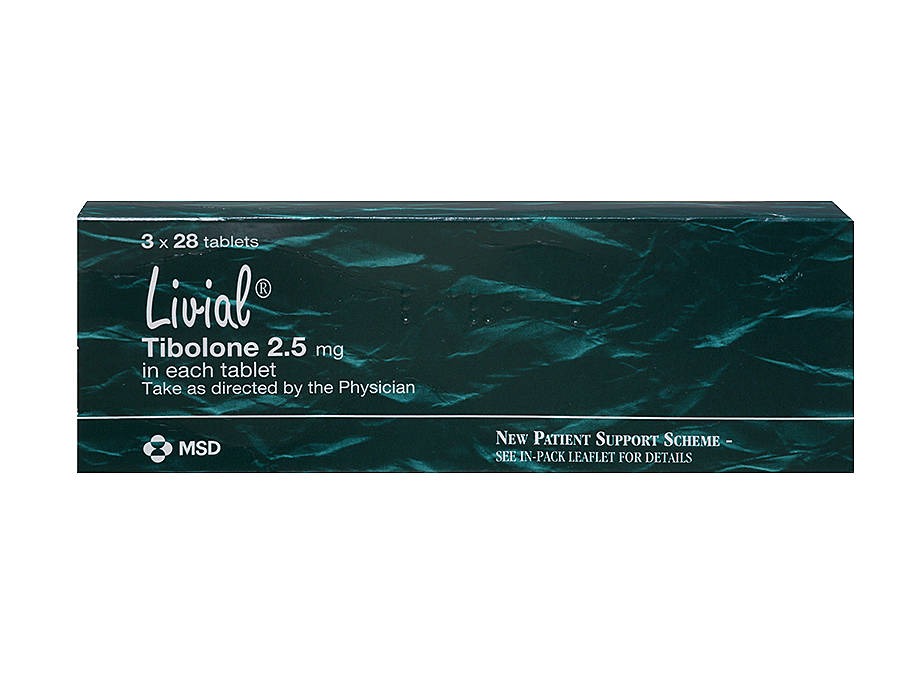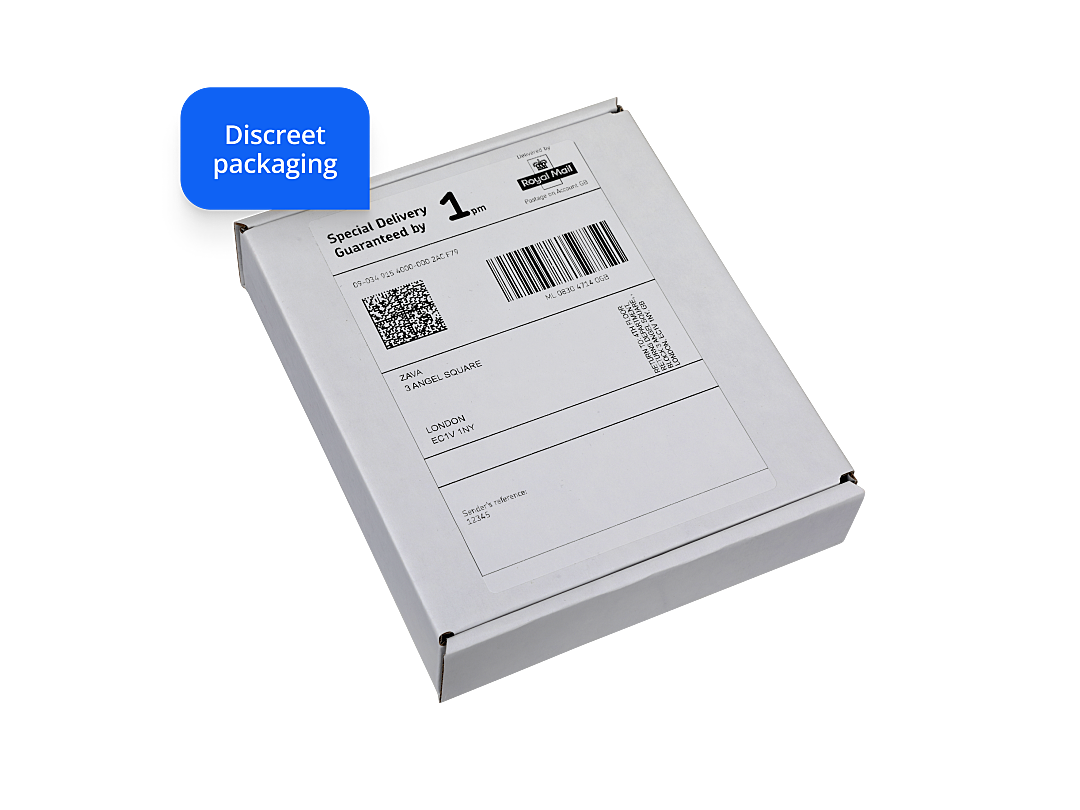



Prices from £35.00
In stock. Simply fill in a brief consultation questionnaire and one of our doctors will review your request today.
-
Tibolone is a medicine used to help manage the symptoms of menopause.
It is also available as a branded medication called Livial. The active ingredient in each tablet is 2.5mg of tibolone. Tibolone is made by Organon.
You can get tibolone as a:
- 1 month supply (28 tablets)
- 3 month supply (84 tablets)
- 6 month supply (168 tablets)
If you have already started taking tibolone on the recommendation of your doctor, you can order further packs from ZAVA.
Prices
28 tablet / 2.5 mg - £35.00
84 tablet / 2.5 mg - £62.00
168 tablet / 2.5 mg - £95.00



About Tibolone
-
-
Tibolone is a type of hormone replacement therapy (HRT). It’s used to treat some of the effects of the menopause that happen as a result of your body producing fewer female hormones, mainly oestrogen
Tibolone can help relieve some of the common menopausal symptoms that can affect your quality of life, including:
- hot flushes
- night sweats
- vaginal dryness
- thinning of the lining of the vagina which can lead to painful sex and an increase in vaginal infections
- mood changes, such as nervousness, depression or irritability
- decrease in libido (sexual desire)
Tibolone can also help prevent osteoporosis. Some women develop osteoporosis as a result of menopause. Osteoporosis causes your bones to become more fragile, which means they can break or be damaged more easily.
If you are at risk of osteoporosis, your doctor may recommend tibolone to reduce the chance of you having a bone fracture (break).
-
-
Take 1 tibolone tablet once a day. Try to take tibolone at the same time each day. Swallow the tablet whole, with water.
If you forget to take a tibolone tablet and:
- it’s less than 12 hours after your usual time, take a tibolone tablet as soon as you remember
- it’s more than 12 hours after your usual time, skip the dose and take the next tablet at the usual time - do not take a double dose
If you think your dose of tibolone is too low or too high, speak to a doctor. They may recommend changing your dose.
Each strip of tibolone tablets is marked with the days of the week to help you keep track of when you’ve taken it. Take the tablet marked by the correct day and follow the arrows. When you have finished a strip of tablets, start the next strip the next day without a break.
If you take more tibolone than recommended, you may feel sick (nausea), be sick (vomit) or have some vaginal bleeding.
If you are switching from a type of HRT where you have no periods, you can start taking tibolone straight away.
If you are switching from a type of HRT where you have periods, wait until your next period. You can start taking tibolone as soon as your period ends.
Tibolone is not a contraceptive and does not prevent pregnancy. If you are less than 50 years old, or if it has been less than a year since your last period, you may need to use contraception to prevent pregnancy.
If you are due to have surgery, speak to your doctor. You may need to stop taking tibolone 4 to 6 weeks before surgery to reduce the risk of developing a blood clot.
-
-
Tibolone works as a synthetic steroid to replace the action of female sex hormones, such as oestrogen and progesterone, in your body.
Oestrogen and progesterone are normally produced in the ovaries. During and after menopause, there is a decrease in hormone production. From the age of around 50, the ovaries stop producing oestrogens. These hormones have lots of effects on the body. They are important for sexual development and controlling the menstrual cycle.
The decrease in hormone production during menopause happens gradually. If the ovaries are removed by surgery before menopause, the decrease in hormone production happens very fast.
The reduction in hormones can trigger symptoms associated with menopause. The severity of the symptoms varies, and not everyone experiences them. If your symptoms are affecting your daily quality of life, a doctor may recommend hormone replacements therapy (HRT) such as tibolone to help reduce menopausal symptoms.
Tibolone is not a hormone, but your body breaks tibolone down to make substances that are similar to hormones. The effects of tibolone are similar to combined HRT medicines, which contain oestrogens and progesterone.
Tibolone can relieve symptoms such as hot flushes and night sweats. Taking tibolone can also lead to improvements in the lining of the vagina, mood, and sexual desire. Tibolone can reduce bone loss in the spine, hip, and wrists.
Some HRT therapies cause monthly bleeding. Tibolone does not stimulate the lining of the womb, so does not cause monthly vaginal bleeding.
-
-
Tibolone is effective in reducing the effects of menopause in most women. It can also be effective at reducing osteoporosis.
Most women taking tibolone will see an improvement in their menopausal symptoms during the first few weeks of treatment.
-
-
Some women experience side effects when taking tibolone. These are mostly mild. You may not experience any side effects when taking tibolone.
Common side effects of tibolone:
- breast pain
- stomach pain or pelvic pain
- unusual hair growth
- vaginal bleeding or spotting
- vaginal problems (increase in secretions, itching, irritation or thrush)
- thickening of the lining of the womb or the cervix
- increase in weight
Uncommon side effects:
- fluid retention leading to swollen hands, ankles or feet
- upset stomach
- acne (spots)
- painful nipples
- breast tenderness
- infections of the vagina
Rare side effects:
- itchy skin
Some women experience irregular bleeding or spotting in the first 3 to 6 months of taking tibolone. You should speak to your doctor if this:
- carries on for longer than 6 months
- starts after you have taken tibolone for 6 months
- carries on after you have stopped taking tibolone
-
-
Tibolone can be taken by postmenopausal women who had their last natural period at least 1 year (12 months ago). If you do not wait for 1 year after your last period before taking tibolone, you may experience irregular bleeding.
If you have experienced premature menopause because of surgery or ovarian failure, speak to your doctor. The risks of hormone replacement therapy (HRT) or tibolone may be different.
Taking HRT or tibolone has both benefits and risks. You should speak to your doctor before taking tibolone, especially if you are over the age of 60.
You should not take tibolone if you are pregnant or think you might be pregnant, or if you are breastfeeding. If you become pregnant whilst taking tibolone, stop taking it and speak to your doctor straight away.
You should not take tibolone if you have any of the following:
- unexplained vaginal bleeding
- endometrial hyperplasia (excessive thickening of the womb lining) that is not being treated
- a blood clotting disorder such as deficiency in protein C, protein S or antithrombin
- porphyria (a rare, inherited blood condition)
- an allergy to tibolone or any of the other ingredients
- cancer that is sensitive to oestrogens such as cancer of the lining of the womb (or if you are suspected of having it)
You should not take tibolone if you have or have ever had:
- breast cancer (or are suspected of having it)
- blood clots (thrombosis) including in the legs (DVT or deep venous thrombosis) or lungs (pulmonary embolism)
- heart attack, stroke or angina
- liver disease and your liver function tests have not returned to normal
If any of these conditions develop whilst taking tibolone, you should stop taking it and speak to your doctor straight away.
With some conditions, there is a risk that they return or become worse during treatment with tibolone. Before starting treatment with tibolone, let your doctor know if you have ever had any of the following conditions, as you may need to have more frequent check ups:
- fibroids in the womb
- endometriosis (growth of the womb lining outside the womb
- endometrial hyperplasia (excessive growth of the womb lining)
- increased risk of thrombosis (blood clots)
- high blood pressure
- a liver disorder, for example a benign liver tumour
- diabetes
- gallstones
- severe headaches or migraines
- an immune system disease such as systemic lupus erythematosus (SLE)
- epilepsy
- asthma
- otosclerosis (a disease affecting the eardrum and hearing)
- a very high level of triglycerides (a type of fat) in your blood
- fluid retention due to cardiac (heart) or kidney problems
If you have a family history of breast cancer, for example, your mother, sister or grandmother has had breast cancer, you should speak to your doctor before taking tibolone. You may be at a higher risk of developing oestrogen-sensitive breast cancer.
You should not take tibolone if you have a rare hereditary problem of galactose intolerance, Lapp lactase deficiency or glucose galactose malabsorption.
If you have an intolerance to some sugars, speak to your doctor before taking tibolone.
-
-
Some medicines can interact with tibolone. Before taking tibolone, you should let your doctor know about any other medicines you are taking. This includes prescription and non prescription medicines, and herbal remedies. You should also tell your doctor about any medicines you have taken recently or are planning to take.
If you are taking any of the following, you may experience irregular bleeding whilst taking Tibolone:
- blood clotting treatments, for example, warfarin
- epilepsy treatments including phenobarbital, phenytoin and carbamazepine
- tuberculosis treatments such as rifampicin
- a herbal remedy, such as St John’s wort
-
-
You may be able to take a different hormone replacement therapy (HRT) treatment if tibolone is not suitable for you. The 2 main types of HRT are:
- oestrogen only HRT, that contains only oestrogen (such as Vagifem)
- combined HRT, that contains oestrogen and a progestogen (such as Elleste Duet Conti)
- tibolone
HRT may be in the form of tablets, patches, or gels.
With some HRT treatments you might still have periods.
A ZAVA doctor can help you decide which type of HRT might be most suitable for you.
-
-
If you are still having natural periods, even with a different type of hormone replacement therapy (HRT), you should not take tibolone. You should not start taking tibolone until at least 1 year after your last natural period. Otherwise, you may experience some spotting or bleeding whilst taking tibolone.

Dr Babak Ashrafi Clinical Lead for Service Expansion
Accreditations: BSc, MBBS, MRCGP (2008)
Babak studied medicine at King’s College London and graduated in 2003, having also gained a bachelor’s degree in Physiology during his time there. He completed his general practice (GP) training in East London, where he worked for a number of years as a partner at a large inner-city GP practice. He completed the Royal College of GPs membership exam in 2007.
Meet our doctorsLast reviewed: 06 May 2022
-
Tibolone 2.5 mg, Patient Information Leaflet, EMC [accessed February 2023]
-
Menopause, National Health Service [accessed February 2023]
-
The effects of tibolone in older postmenopausal women, New England Journal of Medicine [accessed February 2023]
-
Tibolone tablets, Patient [accessed February 2023]
-
Hormone replacement therapy (HRT), Alternatives, National Health Service [accessed February 2023]








